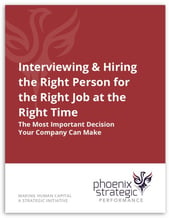Both employee and manager loyalty has always been considered a good thing. So what’s changed? When does being loyal long-term, at all costs, go from a virtue to a liability?
The concept of "change" has changed everything. When companies grew at standard rates, and change was incremental and predictable, manager and employee loyalty could keep pace with each other and the organization's direction. Now, however, when organizations are growing fast and adapting to new technology, new processes and methods, increased customer demands, and additional new employees, the predictable, static environment that many employees are comfortable with has morphed into chaotic, change-driven, unpredictable frontiers where the old rules and controls have evaporated. Increasingly, the latter describes today’s work reality.
Here are some essential questions to consider when thinking about loyalty:
- What does it mean for the employee to be attached to the old rules and controls and have real issues adapting to the new work reality?
- What does it mean for new employees who don’t know the old rules and controls and don’t need to work under those constraints since that work environment has shifted?
- What does it mean for the manager who must manage these two conflicting and competing employee needs?
The New Employee Dilemma
The easiest solution is to ask new employees to deal with the old employees. But is this the new employee’s job? And why would they want to do that? Do they have the skills to do that? Is this the optimal approach? In effect, we ask new employees to do the manager’s job without the manager’s authority or influence. We ask new employees to ‘box by tying one hand behind their back’ in their early stages. At best, it is a workaround with no good resolution. At worst, it is management abdication. In a zero-unemployment environment, why would new employees want to do that without extra ‘battle pay’ for having to do their manager’s job?
There is no doubt that being loyal to employees is a good thing for a manager. However, in the dynamics of a growth organization, when new employees are brought on for their expertise and motivation, a manager’s over-tolerant loyalty to a dysfunctional long-term employee will create problems on many levels. Below is an organizational impact assessment.
Organizational Impact: Consequences of Not Addressing Issues with Existing Employees
The dysfunctional, long-term employee wins because they can’t or won’t change to meet the organization's growth needs. What impact does this have on corporate culture, which allows dysfunction to exist with maximum management tolerance and minimal management intervention?
New employee onboarding and growth acceleration can be compromised or decelerated by the passive behavior of the dysfunctional employee and the absent manager.
New employees must engage in ‘workarounds’ to accommodate the ‘nuances’ of the tolerated dysfunctional employee, which should never be the case.
New employees wonder about the manager's management ability. In reality, the manager is not managing but denying the situation and relying on a management strategy of hope and luck. This is never a great management strategy.
What Can Develop from Well-intentioned Loyalty?
The long-term compromises business growth, and now, dysfunctional employees block optimizing business goals to accommodate personal work preferences.
The long-term employee is stuck in an old reality. While the new work environment is the current reality, the long-term employee can ‘barely function’ with skills quickly becoming stale and depreciating. The manager allows that employee to depreciate by not developing an employee with relevant skills needed in the new work environment.
The new employee, hired for their current skills, will likely become demoralized, demotivated, sub-optimized, and eventually leave. From a business perspective, the manager will have created a suboptimal business environment, not by design but by management's default.
Today, manager loyalty is a good thing. Still, loyalty exists in a multidimensional world where true loyalty must be evaluated as it applies to all employees, management, business goals, owners, shareholders, and investors. It may be time to consider manager loyalty and rethink how you define it.
If you want to learn more about the importance of strategic leadership and change management related to new and existing employee development, download our eBook, The Multifunctional Approach to Transformative Leadership. The eBook focuses on employee transition, aligning employees and the change process, personality profiling, and more.





